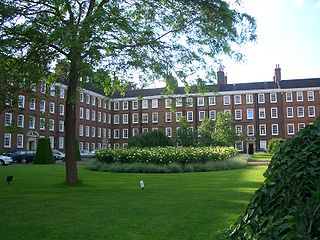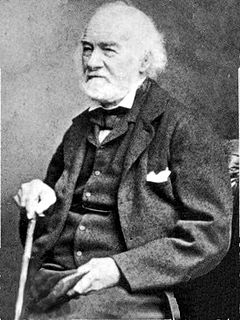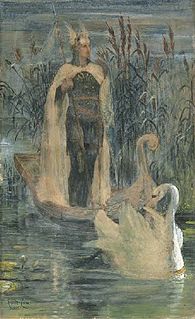The Misfortunes of Arthur, Uther Pendragon's son reduced into tragical notes is a play by the 16th-century English dramatist Thomas Hughes. Written in 1587, it was performed at Greenwich before Queen Elizabeth I on February 28, 1588. The play is based on the Arthurian legend, specifically the story of Mordred's treachery and King Arthur's death as told in Geoffrey of Monmouth's Historia Regum Britanniae .

England is a country that is part of the United Kingdom. It shares land borders with Wales to the west and Scotland to the north. The Irish Sea lies west of England and the Celtic Sea to the southwest. England is separated from continental Europe by the North Sea to the east and the English Channel to the south. The country covers five-eighths of the island of Great Britain, which lies in the North Atlantic, and includes over 100 smaller islands, such as the Isles of Scilly and the Isle of Wight.
Thomas Hughes was an English lawyer and dramatist.

Greenwich is an area of South East London, England, located 5.5 miles (8.9 km) east-southeast of Charing Cross. It is located within the Royal Borough of Greenwich, to which it lends its name.
Contents
Several of Hughes' fellow members at Gray's Inn participated in The Misfortunes of Arthur’s writing and production. [1] Nicholas Trotte provided the introduction, Francis Flower the choruses of Acts I and II, William Fulbecke wrote two speeches, while Francis Bacon, Christopher Yelverton, John Lancaster, and Flower oversaw the dumb show s. Lancaster and John Penruddocke directed the drama at Court. [2] The play was greatly influenced by Seneca the Younger's tragedies, and was composed according to the Senecan model. [1] The ghost of Gorlois, a duke slain by Uther Pendragon, opens the play with a speech reproducing passages spoken by Tantalus' ghost in Thyestes . All action occurs offstage and is related by a chorus, while a messenger announces the tragic events. W. J. Cunliffe demonstrated the influence of Seneca on Hughes, suggesting the play consists largely of translations of Seneca with occasional original lines. [3]

The Honourable Society of Gray's Inn, commonly known as Gray's Inn, is one of the four Inns of Court in London. To be called to the bar and practise as a barrister in England and Wales, a person must belong to one of these Inns. Located at the intersection of High Holborn and Gray's Inn Road in Central London, the Inn is both a professional body and a provider of office accommodation (chambers) for many barristers. It is ruled by a governing council called "Pension", made up of the Masters of the Bench, and led by the Treasurer, who is elected to serve a one-year term. The Inn is known for its gardens, or Walks, which have existed since at least 1597.
William Fullbecke (1560–1603?) was an English playwright, historian, lawyer and legal scholar, who did pioneering work in international law. He described himself as "maister of Artes, and student of the lawes of England."

Francis Bacon, 1st Viscount St Alban, was an English philosopher and statesman who served as Attorney General and as Lord Chancellor of England. His works are credited with developing the scientific method and remained influential through the scientific revolution.
The Misfortunes of Arthur was reprinted in John Payne Collier's supplement to Dodsley's Old Plays, and by Harvey Carson Grumline (Berlin, 1900), who points out that Hughes's source was Geoffrey of Monmouth's Historia Regum Britanniae rather than Thomas Malory's Le Morte d'Arthur .

John Payne Collier, was an English Shakespearean critic and forger.
Geoffrey of Monmouth was a British cleric and one of the major figures in the development of British historiography and the popularity of tales of King Arthur. He is best known for his chronicle The History of the Kings of Britain which was widely popular in its day, being translated into other languages from its original Latin. It was given historical credence well into the 16th century, but is now considered historically unreliable.

Historia regum Britanniae, originally called De gestis Britonum, is a pseudohistorical account of British history, written around 1136 by Geoffrey of Monmouth. It chronicles the lives of the kings of the Britons over the course of two thousand years, beginning with the Trojans founding the British nation and continuing until the Anglo-Saxons assumed control of much of Britain around the 7th century. It is one of the central pieces of the Matter of Britain.








